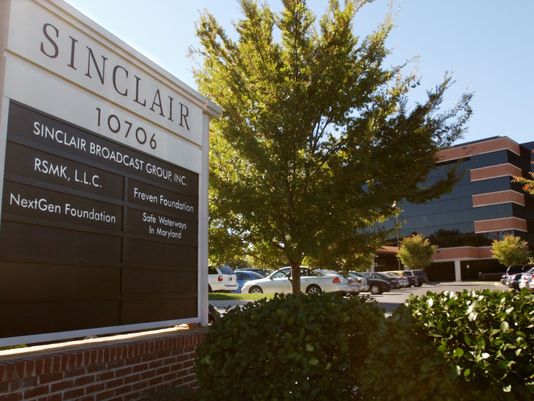Sinclair Becomes Major Player in Television
/It just might be the nightmare that many feared would come true.
Sinclair Television has spent this Summer buying up TV stations and has quickly become a major player in the world of Television.
And it appears they aren't done yet.
USA Today reports that during an analyst conference call in August, David Smith, CEO of Sinclair Broadcast Group, downplayed a possible new federal rule that could prevent the fast-growing company from buying up more stations. "I am not concerned about it right now," he said.
Pressed on the issue, Smith struck a more defiant note. "When you look at trying to constrain broadcasters in this competitive landscape today, to me, it doesn't make a lot of sense," he said. "We really need to be unshackled from that in order to compete against these (cable, satellite and phone) companies."
Smith's aggressive buying binge in recent months has shown that the unshackling of Sinclair is well underway, a development that pleases investors but has regulators and media watchdogs on alert.
In the last 2½ years, Sinclair nearly doubled its portfolio of TV stations to 108 from 58, becoming the largest broadcaster in terms of number of stations. It will own and operate 149 stations when its pending deals are completed.
"They're definitely entering big-time," says Craig Aaron, CEO of Free Press, a media watchdog organization.
With interest rates low and ad dollars plentiful, Sinclair is hardly alone in scooping up TV stations. Other companies — including Gannett, Media General, Nexstar Broadcasting and Tribune Co. — also have bought or announced deals to acquire more stations this year. (Gannett owns USA TODAY.)
But Sinclair's singularly torrid pace of growth has fueled debate about enduring questions on concentration of media ownership and fresh attempts by federal regulators to scale back broadcasters' ambitions.
Sinclair's reach beyond its traditional domain of small-to-midsize markets is also triggering a particular set of worries for media critics, who recall Smith's conservative politics seeping into his stations' coverage in the past. Sinclair executives didn't respond to repeated requests for comment for this story.
Founded by David Smith's father, Julian Sinclair Smith, the company started with one small local station in Baltimore in 1971 and has retained its strong roots in the area. David Smith and his brothers took control of the company in the 1990s and began expanding it by acquiring stations. Sinclair started offering its shares to the public in 1995. But the Smith family firmly controls the company, with a majority stake in its shares. Four of the eight seats on the board are occupied by David Smith and his brothers.
Sinclair's acquisitive mode has been good for investors. Its stock more than doubled — up about 136% — in the last 12 months. Its revenue for the first six months of the year is up 26% from a year ago to $596.8 million.
Particularly eye-opening — and perhaps most illustrative of Sinclair's ambition — is a deal announced in late July to buy the seven stations owned by Allbritton Communications for $985 million. It would give Smith a foothold in the influential Washington, D.C.-market that would be used for a broader national expansion. The deal is expected to close by the end of the year.
Allbritton's WJLA is a premier ABC affiliate, and its NewsChannel 8 is a cable news channel in the D.C. region that pumps out 24 hours of news that could be used by Sinclair to support smaller stations. Smith has suggested that it could provide the framework for establishing a national cable news channel, heightening the company's reach.
Read more from USA Today













